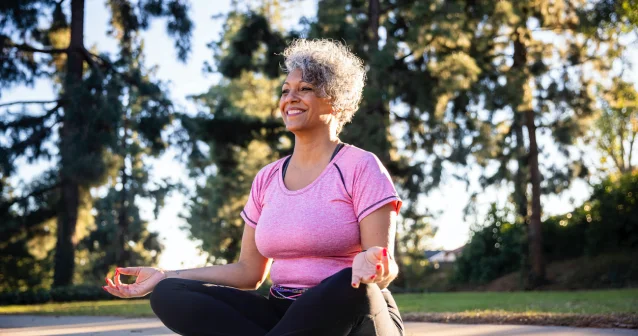Menopause is a natural phase in a woman’s life, marking the end of her reproductive years. While it brings about various changes in the body, one symptom that many women experience is dizziness. Dizziness during menopause can be disconcerting and affect daily life, but the good news is that there are natural remedies that may help alleviate this symptom. In this blog, we’ll explore the causes of dizziness during menopause and delve into various natural approaches to finding balance.
Contents
- 1 Causes of Dizziness During Menopause
- 2 List of Natural Remedies for Dizziness During Menopause
- 2.1 Balanced Diet
- 2.2 Stay Hydrated
- 2.3 Regular Exercise
- 2.4 Herbal Supplements
- 2.5 Deep Breathing and Relaxation Techniques
- 2.6 Adequate Sleep
- 2.7 Limiting Caffeine and Alcohol
- 2.8 Acupuncture
- 2.9 Mind-Body Practices
- 2.10 Vitamin and Mineral Supplements
- 2.11 Chiropractic Care
- 2.12 Cold Compress
- 2.13 Maintain a Stable Blood Sugar Level
- 2.14 Aromatherapy
- 3 How To Incorporate Natural Remedies for Dizziness During Menopause in Daily Life?
- 4 Conclusion
Causes of Dizziness During Menopause

The hormonal changes, particularly the decline in estrogen levels, can have a cascading effect on different bodily systems, leading to symptoms like dizziness. Here are some key causes of dizziness during menopause:
- Hormonal Fluctuations: Estrogen plays a crucial role in regulating various bodily functions, including blood pressure and circulation. As women approach menopause, there is a significant decline in estrogen levels. This hormonal imbalance can affect the autonomic nervous system, leading to changes in blood pressure and contributing to dizziness.
- Vasomotor Symptoms: Vasomotor symptoms, such as hot flashes and night sweats, are common during menopause. These symptoms can result in sudden changes in body temperature, causing the blood vessels to dilate or constrict rapidly. These fluctuations can lead to alterations in blood flow, potentially triggering dizziness.
- Changes in Blood Pressure: Estrogen has a vasodilatory effect, meaning it helps to relax and widen blood vessels. The decline in estrogen levels during menopause can result in changes in blood pressure. Fluctuations in blood pressure can contribute to dizziness and a feeling of lightheadedness.
- Inner Ear Changes: Hormonal fluctuations can affect the fluid balance in the inner ear, which plays a crucial role in maintaining balance. Any disruption in the inner ear can lead to vertigo and dizziness.
- Stress and Anxiety: Menopause is often associated with increased stress and anxiety due to various factors, including hormonal changes, sleep disturbances, and the emotional aspects of this life transition. Stress and anxiety can contribute to dizziness and exacerbate other menopausal symptoms.
- Dehydration: Changes in hormone levels can affect fluid balance in the body. Additionally, hot flashes and night sweats can lead to increased perspiration, potentially causing dehydration. Dehydration can contribute to dizziness and a feeling of weakness.
List of Natural Remedies for Dizziness During Menopause

Natural remedies for dizziness during menopause focus on addressing the underlying hormonal changes, improving circulation, and managing contributing factors like stress and anxiety. Here is a list of natural remedies that may help alleviate dizziness during menopause:
Balanced Diet
Maintaining a balanced and nutritious diet is key to managing hormonal fluctuations and associated symptoms, including dizziness. Consuming foods rich in iron, vitamin B12, and other essential nutrients can help regulate blood flow and minimize dizziness.
Including a variety of fruits, vegetables, whole grains, and lean proteins supports hormonal balance and overall well-being.
Stay Hydrated
Staying hydrated is a simple yet effective natural remedy for managing dizziness during menopause. Ensuring an adequate intake of water helps maintain proper blood volume and circulation, reducing the likelihood of dizziness. Additionally, hydration supports overall well-being and can alleviate other menopausal symptoms such as hot flashes and fatigue.
Menopausal women need to prioritize regular water consumption as part of their self-care routine to promote balance and alleviate the discomfort associated with dizziness during this transitional phase.
Regular Exercise
Engaging in regular physical activity promotes cardiovascular health and helps regulate hormonal levels, potentially reducing dizziness during menopause. Activities like brisk walking, swimming, or yoga can enhance blood circulation, improve balance, and alleviate symptoms associated with hormonal changes.
Herbal Supplements
Some women find relief from menopausal symptoms, including dizziness, through herbal supplements. Examples include black cohosh, dong quai, and ginseng, which are believed to have mild estrogenic effects that may help balance hormonal fluctuations.
However, it’s essential to consult with a healthcare professional before incorporating herbal remedies to ensure they are safe and appropriate.
Deep Breathing and Relaxation Techniques
Stress and anxiety can exacerbate menopausal symptoms, including dizziness. Practicing deep breathing, meditation, or other relaxation techniques can help manage stress levels, promoting a sense of calm and potentially reducing the frequency and intensity of dizziness episodes.
Adequate Sleep
Quality sleep is crucial for overall well-being and can impact hormonal balance. Women experiencing menopausal symptoms, including dizziness, should prioritize a consistent sleep routine, creating an environment conducive to restful sleep, and addressing any sleep disturbances to support their overall health.
Limiting Caffeine and Alcohol
Excessive caffeine and alcohol intake can contribute to dehydration and disrupt sleep, potentially exacerbating dizziness during menopause. Moderating the consumption of these substances may help manage symptoms and promote better overall health.
Acupuncture
Some women find relief from menopausal symptoms, including dizziness, through acupuncture. This traditional Chinese medicine technique involves inserting thin needles into specific points on the body to balance the flow of energy.
While research on acupuncture for menopausal symptoms is ongoing, some studies suggest that it may help alleviate certain aspects of the transition, including dizziness, by promoting relaxation and reducing stress.
Mind-Body Practices
Incorporating mind-body practices such as tai chi or qigong can help improve balance and reduce the frequency of dizziness during menopause. These gentle, low-impact exercises focus on the connection between the mind and body, promoting relaxation, coordination, and overall well-being.
Vitamin and Mineral Supplements
Ensuring an adequate intake of vitamins and minerals, including magnesium and vitamin D, is essential during menopause. These nutrients play a role in various bodily functions, including muscle function and bone health, and may contribute to a reduction in dizziness.
However, it’s important to consult with a healthcare professional before starting any new supplement regimen.
Chiropractic Care
Some women find relief from dizziness through chiropractic adjustments. Misalignments in the spine may impact the nervous system and blood flow, potentially contributing to dizziness. Chiropractic care aims to restore proper alignment, which may alleviate symptoms associated with hormonal changes.
Cold Compress
Applying a cold compress to the forehead or the back of the neck can provide immediate relief from dizziness. The cold sensation may help constrict blood vessels and reduce symptoms. This simple and accessible remedy can be particularly useful during episodes of sudden dizziness.
Maintain a Stable Blood Sugar Level
Fluctuations in blood sugar levels can contribute to dizziness. Eating small, balanced meals throughout the day that include complex carbohydrates, protein, and healthy fats can help stabilize blood sugar levels and minimize symptoms.
Aromatherapy
Certain essential oils, such as peppermint or lavender, may have calming and soothing effects that can help alleviate dizziness. Inhaling the aroma or using essential oil diffusers may provide a sense of relief and relaxation.
How To Incorporate Natural Remedies for Dizziness During Menopause in Daily Life?

Incorporating natural strategies for managing dizziness during menopause into your daily life involves adopting a holistic approach to wellness. Here are lifestyle tips to seamlessly integrate these strategies:
- Establish a Routine: Create a daily schedule that includes regular meal times, exercise, and sleep. Establishing a routine helps regulate bodily functions and contributes to overall balance.
- Stay Active: Incorporate physical activity into your routine, such as daily walks, yoga, or other exercises that you enjoy. Regular movement can improve circulation and contribute to a sense of well-being.
- Limit Stimulants: Be mindful of your intake of stimulants such as caffeine and alcohol. Moderation in consumption can positively impact hydration and contribute to overall balance.
- Create Relaxation Spaces: Designate spaces in your home or workplace for relaxation. Whether it’s a cozy corner with soft lighting or a comfortable chair, having a designated space for relaxation can be beneficial.
- Regular Health Check-ups: Schedule regular check-ups with your healthcare provider to discuss your overall health and any menopausal symptoms you may be experiencing. This ensures you receive personalized guidance and support.
- Be Mindful of Triggers: Identify and be mindful of specific triggers that may exacerbate dizziness. This awareness allows you to make informed choices and adjust your environment accordingly.
- Stay Informed: Educate yourself about menopause and its associated symptoms. Understanding the changes happening in your body can empower you to make informed decisions about your health.
- Celebrate Achievements: Acknowledge and celebrate your achievements, no matter how small. Positive reinforcement can contribute to a positive mindset and emotional well-being.
Conclusion
Dizziness during menopause is a common symptom that can be managed through a holistic approach. By incorporating these natural remedies into your lifestyle, you can support hormonal balance, improve circulation, and alleviate stress, ultimately finding balance during this transformative phase of life.
However, it’s essential to consult with a healthcare professional before making significant changes to your diet or adding herbal supplements to your routine, especially if you have underlying health conditions.
If you are facing menopause-related issues, menopause treatment at HerMantra can help. Book your free trial online menopause treatment session now.


